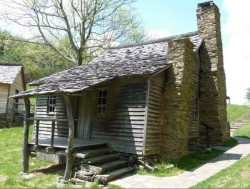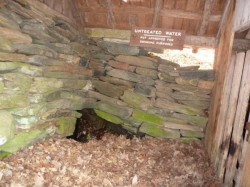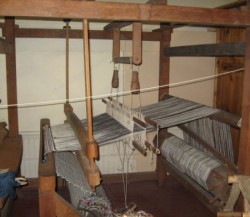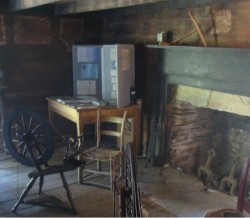 A short drive farther up the Blue Ridge from the Church of the Frescoes you will happen upon Brinegar Cabin. This cabin was hand built by Martin Brinegar in the late 1800s. Somewhere around 1880. The family lived in the small cabin on 125 acres of property, and raised their family of at least 3 children here. They farmed the land and Caroline Brinegar maintained a family vegetable garden.
A short drive farther up the Blue Ridge from the Church of the Frescoes you will happen upon Brinegar Cabin. This cabin was hand built by Martin Brinegar in the late 1800s. Somewhere around 1880. The family lived in the small cabin on 125 acres of property, and raised their family of at least 3 children here. They farmed the land and Caroline Brinegar maintained a family vegetable garden.
In addition to the main cabin, there are a few other structures on the property.
 The Brinegars had a Spring House, a 3 walled structure, through which a cool sparkling spring bubbled up. The Brinegars used this spring for drinking and cooking water, but also to keep food chilled. They would place their food directly into the cold spring and the cold water would keep the food from spoiling. A morning trip to the spring was a ritual enjoyed by all members of the Brinegar family, mostly Caroline. Lugging large pails of water up the steep hill to the cabin was what supposedly kept Caroline in good physical shape.
The Brinegars had a Spring House, a 3 walled structure, through which a cool sparkling spring bubbled up. The Brinegars used this spring for drinking and cooking water, but also to keep food chilled. They would place their food directly into the cold spring and the cold water would keep the food from spoiling. A morning trip to the spring was a ritual enjoyed by all members of the Brinegar family, mostly Caroline. Lugging large pails of water up the steep hill to the cabin was what supposedly kept Caroline in good physical shape.
 There was also an outhouse and a food pantry with a root cellar below. Inside the cabin, stands the large 4 poster loom that Caroline had inherited from her mother. She made all the family’s clothing and warm blankets on this loom. Park Rangers still give loom demonstrations on the weekends in the cabin. The one in the picture to the right is the same type of loom used by Caroline Brinegar.
There was also an outhouse and a food pantry with a root cellar below. Inside the cabin, stands the large 4 poster loom that Caroline had inherited from her mother. She made all the family’s clothing and warm blankets on this loom. Park Rangers still give loom demonstrations on the weekends in the cabin. The one in the picture to the right is the same type of loom used by Caroline Brinegar.  The spinning wheels below are from inside the Brinegar cabin and are still used today by the Blue Ridge Park Rangers who conduct the loom demonstrations.
The spinning wheels below are from inside the Brinegar cabin and are still used today by the Blue Ridge Park Rangers who conduct the loom demonstrations.
Harvest Day Festival – Oct. 2, 10:00 a.m. – 4:00 p.m., Brinegar Cabin, Milepost 238, Blue Ridge Parkway
Visit the original cabin and site of Martin & Caroline Brinegar’s homeplace. Whether by location or choice, the Brinegars probably lived a more self sufficient lifestyle than many well into the 1900s. Fall is the time to finish harvesting the crops and plow the garden before winter sets in. Come see how the Brinegars made apple butter and other food preservation skills, as well as putting the garden to bed for the winter.